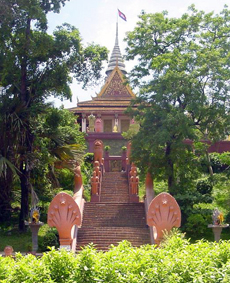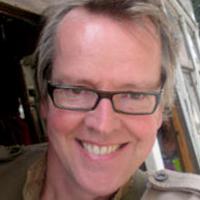
I thought I had left Communist rule behind in Vietnam. But here in Phnom Penh I have just seen a chilling sign on the side of a restaurant: "We Have to Serve Buffet. $2.50."
Treasure your freedom, my Canadian friends.
I am certainly treasuring mine, and Phnom Penh has granted it to me. It took only about a day for the change to take hold. I'm not entirely certain why I caught the Vietnam Blues and I'm not sure why they stopped at the border. But the Cambodian capital just feels better.
Here, I am rarely bothered. There are the usual pitches from motorcycle taxi boys and the pleas of beggars. But since my arrival here I have yet to play the role of one-man circus, rolling down the street. Why was it that in Vietnam I was frequently treated like Johnny the Dog-Faced Boy or a drunk dripping 100-dollar bills, whereas in Cambodia I'm just a regular white guy? Are there stages that countries go through in their attitude to visitors as the tourist trade develops, with initial curiosity and friendly indifference eventually giving way to a gold-rush mentality? Or is the different reaction a reflection of a different national character? Three days in Phnom Penh are not quite enough to crack that one.
Wrestling with demons
The food, the markets, the regular availability of the International Herald Tribune -- Phnom Penh is working on me like a tonic. Street vendors offer up lotcha, a dish of short noodles with greens, beef, and a fried egg. Bananas roasted in sticky rice are waiting at curbside outside the Tuol Tom Poung market. Inside the market I found Khmer dancing masks -- fabulously detailed paper mache helmets depicting men and monkeys and demons, good and bad.
A woman named Mom boxed up five of the masks for me, and I hired a guy with a battered but determined little tuk-tuk to take me to a courier. So nonsensical are the Phnom Penh addresses that even this street-savvy veteran needed to borrow a pedestrian's cell phone for directions in finding #175 Mao Tse Toung Road (eventually discovered nestled in between #270 and #290).
Alas, the shipping price was too high and we set off across town to the post office, clattering down the remarkably wide boulevards past grand structures like the Royal Palace and gorgeous Wat Phnom, perched atop a hill. (On a later visit to Wat Phnom I would watch one young soldier pause uncertainly at the door of the temple, probably concerned about an interesting point of Buddhist etiquette -- is it enough to take off your shoes when you also happen to be carrying an AK-47?)
After sending my package off to meet me in Vancouver I relaxed over noodles and coffee in another nearby market. A large rat trotted casually past my table. I turned to glance at the proprietor and she returned an acknowledging smile that said, "Why yes, he is cute, isn't he?"
He really was. Everything's sweet when you're on your honeymoon.
Romantic metaphors do seem appropriate right now. Why does one human make you hot while another perfectly swell sweetie is nothing to you but a pant-full of cold porridge? Why does one destination irk while another relaxes?
It's a mystery. But here I sit at my favorite street-side café in Phnom Penh with an iced coffee on the table (the coffee was better in Hanoi), the sun blazing on the dirt street, motorcycle boys calling out from the shade, two televisions on different channels cranking out Asian cheese at maximum volume, and a radio blaring the schmaltzy muzak that seems inescapable all over South East Asia. While I read the paper in perfect peace.
Pol Pot's ghost
The Phnom Penh I am seeing now was not here a decade ago. Writing in the Globe & Mail, William T. Vollman said that as recently as 1991 "one could stand in the middle of the widest boulevard in Phnom Penh and count stars." A South African NGO worker I spoke to told me that in the last eight years the pace of change has been phenomenal. At first, she said, NGO efforts seemed to bear little fruit, but finally gained traction after the 1997 coup that gave the city some added stability.
Now the curfew is gone, there are traffic lights, the main streets are paved and clean -- all fairly recent developments. But the civic structure is still fragile. It takes more than a little paint and polish to bounce back from Armageddon.
The ghost of Pol Pot is just the biggest of many that haunt Phnom Penh. Cambodia is clogged with ghosts. A relative handful can be met at the Genocide Museum, located on the grounds of a former school that became the Tuol Sleng prison/torture camp. About 20,000 died here. The rows of anonymous photographs on display are but a small tributary running to a vast ocean of lost souls.
The Khmer Rouge horror is still fresh. Not many of us were around when big band music ruled the airwaves and Hitler ruled Europe, but Pol Pot's young killers did their work in what we fondly call the disco era. Many Phnom Penh residents are of the same generation that seeded the vast bone-fields of the Cambodian countryside. The still-young guides who lead groups through the museum were frightened children in the late 70's, fleeing with some lucky family members, losing others forever. The Genocide Museum makes one wistful for a city like Paris, where the Place de la Bastille is just a monument in a traffic circle.
High anxiety
Today, Phnom Penh is still jumpy. Recent political troubles have caused opposition leader Sam Rainsy to flee the country to avoid prosecution for defaming the government. In a place with such a troubled history you might expect this fuss to feel like a few mere raindrops in a Tornado Alley trailer park -- nothing much to worry about. In fact, my NGO friend said, such political dust-ups make locals very nervous indeed. "There's always a sense that all the progress could be wiped out," she told me.
Phnom Penh knows what it is like to crawl back from disaster. But unlike the towns crushed by December's tsunami, Cambodia's was not a blameless tragedy, and many of the perpetrators of the genocide still walk free. There was no Nuremberg for this devastated country, no national act of closure. The wounds are as close to the surface as the mass graves tourists can visit at the killing fields of Choeung Eck.
So it feels a little odd that I should be so relaxed here. But I'm grateful and happy for it, and I pray the same relaxation will be possible in five years or 10. Phnom Penh has earned some peace.
Steve Burgess is growing homesick and is winding down his dispatches for The Tyee from Asia. Expect at least one more next week, though.
Other Postcards:
- Escape from Vietnam
- Vietnamese Driving Lessons
- Burgess and the Red Dragon
- Burgess and the Big Night Out
- Walkabout with Hanoi Steve
- Burgess in Bangkok
- Dispatch from Hong Kong















Tyee Commenting Guidelines
Comments that violate guidelines risk being deleted, and violations may result in a temporary or permanent user ban. Maintain the spirit of good conversation to stay in the discussion.
*Please note The Tyee is not a forum for spreading misinformation about COVID-19, denying its existence or minimizing its risk to public health.
Do:
Do not: